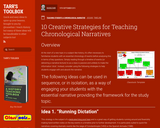
This resource provides instructional strategies for teaching chronological narratives.
- Subject:
- Social Studies
- Material Type:
- Activity/Lab
- Provider:
- Tarr's Toolbox
- Date Added:
- 08/17/2017

This resource provides instructional strategies for teaching chronological narratives.
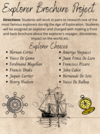
Students will be allowed to select a partner and will be assigned a specific explorer from the age of exploration. Depending on the class, you can let the student select their explorer, but part of the idea is that each group has a different person to research as the projects will be presented to the class and help in the instruction and learning of each explorer. They will inherently be collaborating as they are working in pairs. They will be communicating their ideas, thoughts, and research by publishing their brochure and video for others across the grade level to see. Some will even be used as examples in future years. They are allowed nearly full creative power other than that they have to create a brochure on Canva. The critical thinking piece comes from doing their own research into the lives, explorations, and adventures of their explorer, deciding what is important and what they want to include, as well as how they will present their findings. They will also be tasked with identifying the impact that this explorer had on the world both during their time as well as how that impacts us today.
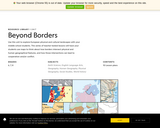
The purpose of this unit is to help students use maps and understand borders and their impacts in Europe. It contains materials to help students use maps to think about how borders intersect physical and human geological features and how those intersections can lead to cooperation and/or conflict. There are 10 lessons in the unit.

Why did the German people and the rest of the world allow the Nazi dictatorship to establish itself, label certain groups as "different" or "human", remove individual rights and freedoms from those groups, and violently persecute those sections of society? In this lesson, students explore these questions and more as they use the Holocaust as a context for exploring the dangers of remaining silent, apathetic, and indifferent in the face of oppression of others.
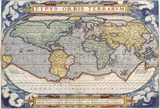
This resource is designed to assist students in understanding of the Eruopean explorers, who they were, what they did, and what impact they have on the modern world. Students will watch brief biographgical videos from Bio.com and History.com about each explorer to complete the questions on the graphic organizer.

In this lesson, students will view the short documentary about current North Carolina resident Peter Stein, a Holocaust survivor who was born in 1936 in Prague, Czechoslovakia to a Jewish father and a Catholic mother, just two years before Nazi occupation. His father was forced into slave labor and later deported to Terezin (Theresienstadt) - a work and death camp - and managed to survive, but his family of eight were all killed. Through the platform of Peter’s moving story, students will explore the realities of life in Terezin, while comparing this to the 1944 propaganda campaign Hitler launched with Terezin at its core. Based on Peter’s insights and words of wisdom, students will then explore what they believe the most important lessons of the Holocaust are by creating their own mural.
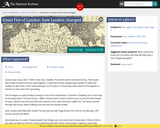
This lesson discusses the Great Fire of London in 1666 and its causes as well as its repercussions long after.

In this lesson, students explore the active citizens who resisted the tyranny and atrocities committed by Hitler and the Nazi party, as well as those who worked to assist and rescue those targeted. Upon exploring these brave people, students will choose a person from the Holocaust who exhibited active citizenship, deliver a speech in their honor, and present them with a citizenship award at a mock reception.

In this lesson, students explore the concept of memory and the various ways people choose to process and share their memories. Focusing on memories from those who experiences the Holocaust, students explore the way various mediums (testimony, art, poetry, etc.) can teach us about the past. Finally, students focus on poetry and art written by children of the terezin concentration camp in which the authors share various memories and write a letter to their chosen child sharing what they wish they could say to him/her.

In this lesson, students learn about non-Jewish victims of the Holocaust. Students work in groups to read excerpts from the 'The Other Victims: First-Person Stories of Non-Jews Persecuted by the Nazis', which highlights the experiences of additional groups deemed undesirable by Hitler, including Gypsies, African-Germans, Jehovah's Witnesses, Poles, political prisoners, and more. Students then connect the themes present in the persecution of these groups to occurrences within their own school and community, gaining an understanding of the danger of intolerance.

Students will receive an overview of the Holocaust via PPT, class discussion, readings, and creative activities. Students will begin by exploring prewar Jewish life, helping them understand that individual lives are behind Holocaust statistics. Students will illustrate their understanding of this period of history by creating a blended poem of their own words and the words of a Holocaust survivor.

This resource contains over 200 animated historical maps.
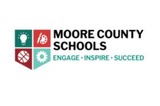
Students will use primary and secondary sources to create and share a narrative of Global Historical Figures from the 20th Century. Using a Gallery Walk format, students will gather information from their classmates' creations.

Students learn about the impact of World War II on the Netherlands and Jews. Students gain a comprehensive understanding of the realities experienced by individual lives throughout this tumultuous period and create an award and speech to honor Holocaust survivors living in North Carolina.

In this activity, students will learn about the personal experiences of Japanese American incarcerees during World War II and will practice communicating information concisely by developing an original comic.

In this lesson, students will explore the motives of Christopher Columbus's 1492 exploration, the controversy surrounding the changes Columbus's voyages initiated, and the impact of the Columbian Exchange on Native American cultures. Students participate in two simulation activities and a class discussion of these topics.